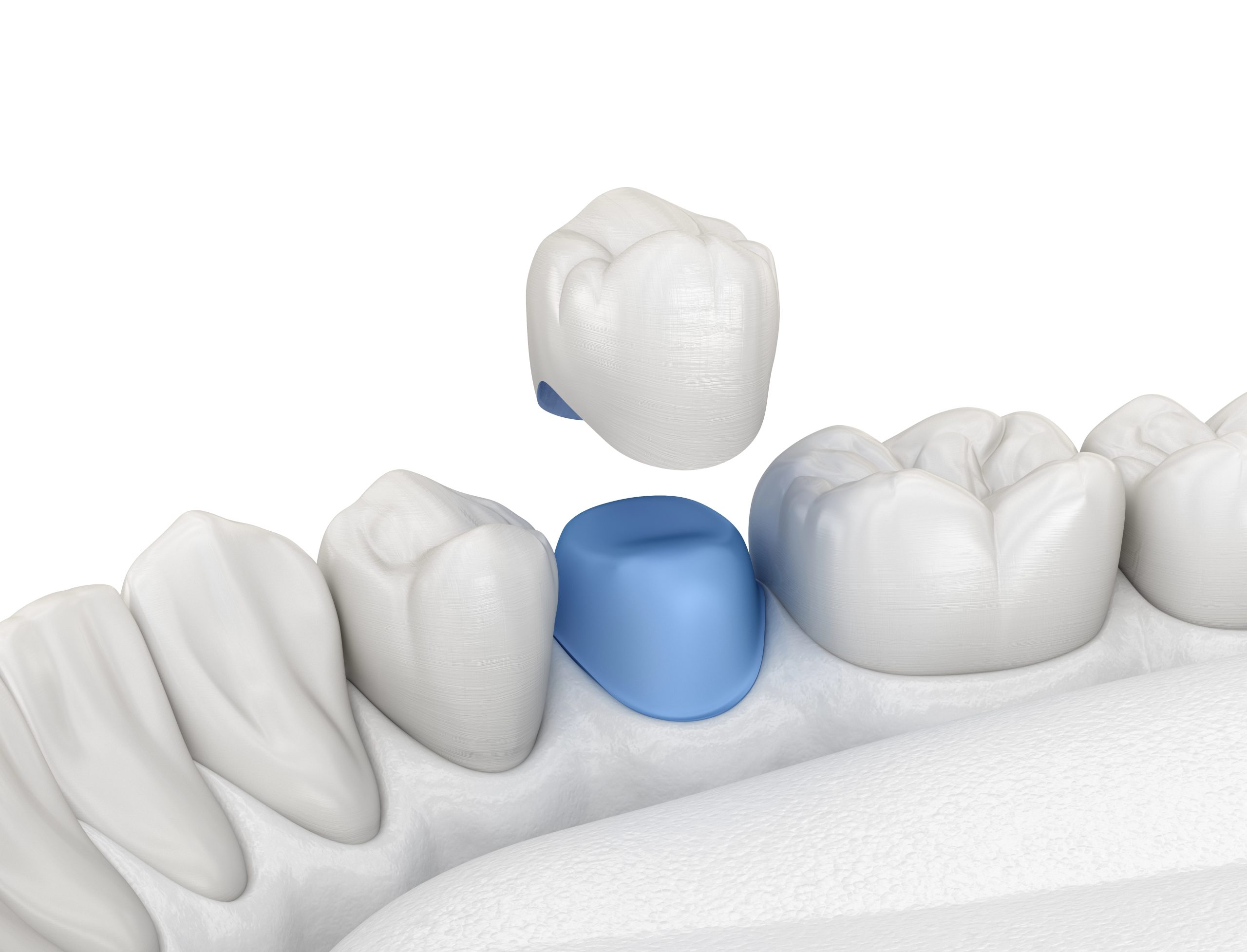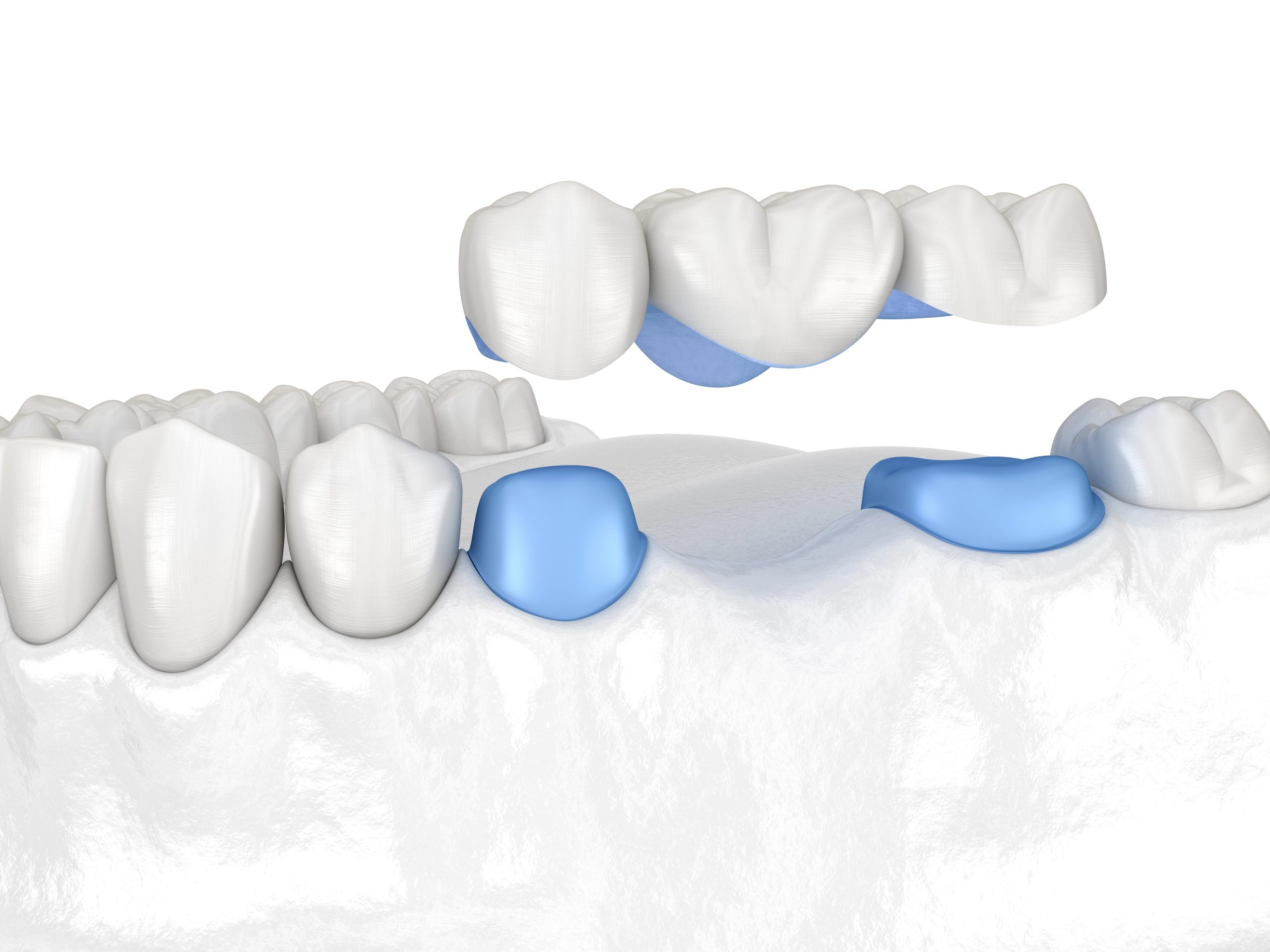Dental Crowns and Bridges in Thornhill
Dental crowns and bridges are time-tested restorative solutions designed to repair damaged teeth and replace missing ones. These custom-made prosthetics not only restore function but also enhance the appearance of your smile, helping you maintain a strong and healthy bite.
To better understand these restorative treatments, let’s explore crowns and bridges individually.
Dental Crowns: Strengthening and Protecting Teeth
A dental crown is a tooth-shaped cap that covers and protects a weakened or damaged tooth. It restores the tooth’s structure, function, and appearance while preventing further damage.
When is a Crown needed?
Our Thornhill dentist may recommend a dental crown if you have:
✔ A tooth weakened by decay or large fillings
✔ A cracked, chipped, or worn-down tooth
✔ A tooth that has undergone root canal therapy
✔ A missing tooth that needs support for a dental bridge
✔ A cosmetic concern that requires an aesthetic enhancement

Types of Dental Crown
Crowns are made from various materials, each offering unique benefits:
1
Blend seamlessly with natural teeth for an aesthetically pleasing result.
2
Known for their durability and strength.
3
Offer a balance of strength and natural appearance.
4
Often used as temporary crowns or for patients with metal allergies.
Our team will help you choose the best material based on your dental needs and aesthetic preferences.

Dental Bridges: Replacing Missing Teeth
A dental bridge is a fixed restoration that replaces one or more missing teeth by using adjacent teeth or implants for support. It consists of artificial teeth, known as pontics, anchored by abutment teeth on either side.
Why Choose a Dental Bridge?
Dental bridges offer several advantages, including:
✔ Preventing neighboring teeth from shifting into empty spaces
✔ Restoring the ability to chew and speak properly
✔ Enhancing the appearance of your smile
✔ Maintaining proper bite alignment
Types of Dental Bridges
Just like crowns, bridges are available in different materials:
1
Best for a natural look that blends with surrounding teeth.
2
Offer durability with an aesthetically pleasing finish.
3
A strong and long-lasting solution for replacing multiple missing teeth without relying on natural teeth for support.
Understanding the Crown and Bridge Process
Placing tooth crowns or tooth bridges typically involves several steps across multiple office visits. The journey begins with meticulous preparation of the teeth involved.
1. Tooth Preparation: The dentist reshapes the specific tooth structure for a crown or the abutment teeth for a traditional bridge. This involves prepared teeth and creates room for the restoration. For options using dental implants, this stage follows implant placement and integration with the bone.
2. Digital scanning: A dental scan of the prepared area is done.
3. Laboratory Crafting: These impressions guide skilled technicians at the dental laboratory who craft the custom crown or bridge using the right choice of materials.
4. Temporary Placement: Often, a temporary restoration (like a temporary bridge, where applicable) is placed to protect the prepared teeth between visits.
5. Final Fitting: During a subsequent appointment, the temporary is removed, and the permanent crown or bridge is carefully evaluated for fit, bite, and appearance before being permanently cemented.

Caring for Your Crown or Bridge
So, you’ve got your new crown or bridge – fantastic! Now, let’s talk about keeping it looking and feeling great for the long haul.
This dedicated care is the key to a successful treatment outcome. Good oral hygiene is key because the areas around your restoration still need good care to protect underlying teeth and maintain gum health. This also pertains to implant crowns and implant bridges.
Here’s how to keep things shipshape as part of your regular oral health routine:

- Brush and Floss Daily: Be thorough, especially right where the crown or bridge meets the gum line – plaque loves to hide there! This is fundamental oral health maintenance.
- Bridge Care: Got a bridge? Make sure to clean underneath the artificial tooth every day. Ask your dental team about the best tools, like floss threaders or other helpful products.
- Don’t Skip Check-ups: Regular professional cleanings and exams are your best bet for catching any tiny issues early and keeping everything healthy.
- Mention Your Health: Give your dentist a heads-up about your overall health status; care might need tweaking for patients with health conditions.
- Be Kind to Your Restoration: Try not to bite down hard on things like ice or use your teeth for opening packages – you don’t want to risk chips or cracks.
This consistent attention helps ensure your restoration lasts and supports your overall oral health.
Whether you need a crown to strengthen a tooth or a bridge to fill a gap, our Thornhill dental team is here to help. We’ll guide you through the options and create a personalized treatment plan to restore the health, function, and beauty of your smile.
📞 Schedule your consultation today and take the first step toward a healthier, more confident smile!
Frequently Asked Questions About Crowns and Bridges
Bridge vs. implant – which is better for a missing tooth?
Both are excellent treatment options. A dental implant replaces the tooth root and stands alone without affecting adjacent teeth, while a bridge usually relies on support from neighbouring teeth (which may involve filed-down teeth). Your dentist will discuss the bridge vs. implant pros and cons for your specific situation.
What is the healing process like after getting a crown or bridge?
The healing process for standard crowns and traditional bridges typically involves minimal recovery times. Some temporary tooth sensitivity to temperature changes is possible, but usually resolves quickly.
How much natural tooth structure is removed for a crown?
The amount varies depending on the situation and crown material, but your dentist removes only the minimum natural tooth enamel necessary. Enough structure is reshaped to allow the crown to fit securely and blend properly while preserving as much healthy tooth as possible underneath.
How long can I expect these prosthetic devices (crowns and bridges) to last?
With consistent oral hygiene and regular dental visits, crowns and bridges often last for many years, potentially 10-15 years or even longer. Factors like the materials used, your bite, and ongoing oral health maintenance all play a role in the longevity of these prosthetic devices.
Dental Crowns and Bridges Articles:
Canadian Dental Care Plan (CDCP) Accepted
We are proud to participate in the Canadian Dental Care Plan (CDCP) to help make essential dental care more accessible. Our dental clinic accepts patients under this federal plan, covering various preventative care and restorative dentistry services, including professional cleanings and dental treatment.
If you are a member of the CDCP, please bring your member card to your next dental appointment. Our dental staff will help you understand your coverage and maximize your benefits for a healthier smile.
Our Office
390 Steeles Avenue West #205 Thornhill, ON L4J 6X2
Email: [email protected]
Phone: (905) 707 6477
Quick Links
Office Hours
Monday to Wednesday 9AM-8PM
Thursday and Friday 9AM-7PM
Saturday (Every Other)9AM-3PM
Sunday Closed
Do you need endodontics treatment?
If you’re experiencing tooth pain or suspect you may need a root canal, don’t wait. Our Thornhill dental team is here to provide expert endodontic care to relieve discomfort and restore your smile.
1
Book an Appointment
Choose a time that works for you.
2
Download Patient Forms
Fill out your info at your own pace.

